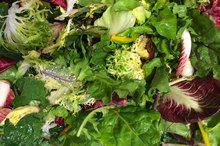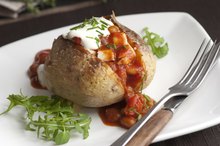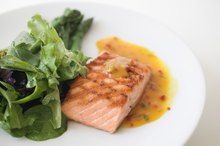What does fact checked mean?
At Healthfully, we strive to deliver objective content that is accurate and up-to-date. Our team periodically reviews articles in order to ensure content quality. The sources cited below consist of evidence from peer-reviewed journals, prominent medical organizations, academic associations, and government data.
- Linus Pauling Institute: Potassium
- U.S. Food and Drug Administration: Guidance for Industry -- A Food Labeling Guide (10. Appendix B: Additional Requirements for Nutrient Content Claims)
- Archives of Internal Medicine: Sodium and Potassium Intake and Mortality Among US Adults -- Prospective Data From the Third National Health and Nutrition Examination Survey
- Archives of Internal Medicine: Sodium and Potassium Intake and Mortality Among US Adults -- Prospective Data From the Third National Health and Nutrition Examination Survey
The information contained on this site is for informational purposes only, and should not be used as a substitute for the advice of a professional health care provider. Please check with the appropriate physician regarding health questions and concerns. Although we strive to deliver accurate and up-to-date information, no guarantee to that effect is made.
What Is the Potassium Content in a Banana?
A 2012 study published in "The American Journal of Clinical Nutrition" reported that approximately 98 percent of American adults do not consume enough potassium each day 5. Eating bananas is commonly touted as a good way to increase your potassium intake, but bananas are not as rich a source of the mineral as many other fresh fruits and vegetables. Talk to your doctor or a nutritionist if you're concerned about getting enough potassium in your diet.
Potassium Content
The U.S. Department of Agriculture reports that a medium-sized fresh banana that's between 7 and 7 7/8 inches long contains approximately 422 milligrams of potassium. Adult men and women should have 4,700 milligrams of potassium each day, and one banana fulfills 9 percent of this requirement. According to the Food and Drug Administration's guidelines, bananas cannot be considered a good source of potassium since they do not provide at least 10 percent of the recommended daily allowance of potassium.
Comparison to Other Foods
How Much Potassium Does a Female Need?
Learn More
A banana contains about as much potassium as a 1-cup serving of cooked celery, 1 cup of canned grapefruit sections, 1/2 cup of cooked spinach, 1 ounce of sunflower seeds or 6 fluid ounces of tomato juice. Foods that provide between 10 and 19 percent of an adult's RDA of potassium include 1/2 cup of raisins, 6 fluid ounces of prune juice, 1 cup of cooked beans such as black beans and a medium-sized baked potato. Excellent sources of potassium -- foods with more than 20 percent of the RDA per serving -- include dried apricots, green soybeans, almonds and canned tomato puree.
Importance
Your body uses the potassium you obtain from foods like bananas to trigger enzymes that break down carbohydrates and to aid in building strong teeth and bones. Potassium is required to maintain the electrolyte concentration that allows your muscles to contract and your nervous system to transmit impulses. If your diet doesn't contain adequate potassium, you're significantly more likely to die of heart disease, says a 2011 study published in the "Archives of Internal Medicine." You also have an increased risk of osteoporosis, hypertension, stroke and kidney stones.
- Your body uses the potassium you obtain from foods like bananas to trigger enzymes that break down carbohydrates and to aid in building strong teeth and bones.
- Potassium is required to maintain the electrolyte concentration that allows your muscles to contract and your nervous system to transmit impulses.
Serving Tips
Foods With Potassium Bicarbonate
Learn More
For a potassium-rich breakfast, try whole-wheat banana pancakes or waffles with grapefruit or orange juice. Serve roasted bananas mixed with other fruit as a light side dish for grilled fish like yellowtail or swordfish, which both contain over 500 milligrams of potassium per serving. As a snack, pair a banana with a mixture of roasted unsalted nuts and seeds.
Related Articles
References
- Linus Pauling Institute: Potassium
- USDA National Nutrient Database for Standard Reference: Basic Report -- 09040, Bananas, Raw
- USDA National Nutrient Database for Standard Reference: Nutrients -- Potassium, K (mg)
- University of Maryland Medical Center: Potassium
- Archives of Internal Medicine: Sodium and Potassium Intake and Mortality Among US Adults -- Prospective Data From the Third National Health and Nutrition Examination Survey
- Aburto, et. al. Effect of increased potassium intake on cardiovascular risk factors and disease: systematic review and meta-analyses. BMJ. 2013 Apr 3;346:f1378. DOI: 10.1136/bmj.f1378.
- Appel LJ, Moore TJ, Obarzanek E, et al. A clinical trial of the effects of dietary patterns on blood pressure. DASH Collaborative Research Group. N Engl J Med. 1997;336(16):1117-1124.
- Ferraro PM, et. al. Dietary Protein and Potassium, Diet–Dependent Net Acid Load, and Risk of Incident Kidney Stones. CJASN. October 2016, 11 (10) 1834-1844; DOI: 10.2215/CJN.01520216
- Granchi, D, et. al. Potassium Citrate Supplementation Decreases the Biochemical Markers of Bone Loss in a Group of Osteopenic Women: The Results of a Randomized, Double-Blind, Placebo-Controlled Pilot Study. Nutrients. 2018 Sep 12;10(9). pii: E1293. DOI: 10.3390/nu10091293.
- Linus Pauling Institute. Potassium.
- Macdonald, HM, et. al. Effect of potassium citrate supplementation or increased fruit and vegetable intake on bone metabolism in healthy postmenopausal women: a randomized controlled trial. Am J Clin Nutr. 2008 Aug;88(2):465-74.
- National Institute of Health. Office of Dietary Supplements. Potassium.
Writer Bio
Michelle Kerns writes for a variety of print and online publications and specializes in literature and science topics. She has served as a book columnist since 2008 and is a member of the National Book Critics Circle. Kerns studied English literature and neurology at UC Davis.









